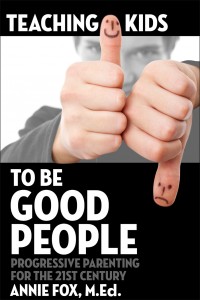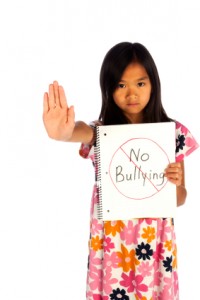|
|
September 19, 2012
Aside from giving birth to my own children, nothing provides me with more delight and a creative high than producing a new book. To find out why I decided, after 25 years of writing exclusively for kids, to write a book for adults, and why every parent and educator at least ought to explore Teaching Kids to Be Good People, please read the introduction.
____________
 The book I've been working on for 15 years
Obviously not all teachers are parents, but all parents are teachers. That’s convenient because good character traits, like empathy and respect, are teachable skills that need to be learned at home as well as at school. When we teach kids to be good people we help the world become a safer, saner, more equitable place for all of us. Nothing is more important than that!
But these are tough times for character educators. I know because I’ve been working in schools with students, teachers, and parents for more than 30 years as well as online since 1997. The job is getting harder. The values promoted by mass media work against us. What passes for entertainment is frequently mean-spirited. Character assassination in public discourse is the air we breathe, and the resulting pollution is a hazard to our well-being. It’s a huge problem, but what can we do?
When our kids plug in, which is most of the time, they encounter few positive adult role models. Online and off, our culture frequently ignores or rewards cruelty. This is why our children desperately need us to do a better job mentoring them in the direction of respect and kindness.
Our kids are good kids, but they are constantly challenged by the less-than-compassionate standards of their peers with whom they are mind-linked 24/7. Today’s teens suffer from status anxiety at levels no other generation has endured. This compels them to do whatever it takes to fit in, including things they are not particularly proud of. Despite these ubiquitous challenges I am confident we can teach our kids to be good people who actively seek opportunities to help others and who have the social courage to act on their good intentions.
We parent-educators are gardeners. We plant seeds and offer nurturing lessons that our kids can internalize. But we are not our children’s only influencers. By rededicating ourselves to teaching our kids to be good people, we provide them with the tools to do the right thing while we’re right there beside them and when they’re on their own. Whether they actually do it, is their choice. But at least we’ll know we’ve done our part well.
To help on our parenting journey, I’ve written this very personal and pragmatic guide that includes essays, podcasts, prompts, tools, questions, answers, and self-assessment quizzes all for the purpose of teaching kids to be good people.
How do you define a “good person?” That’s what I wanted to find out, so I crowdsourced the answer by posting the question. I received hundreds of responses. Eight concepts kept reappearing: Emotional intelligence, ethics, help, forgiveness, compassion, empathy, acceptance, and social courage—all essential, teachable skills. This book will help you teach them to your children or students. Hopefully, we’ll become so engaged in this process that we will inspire all of our children to become part of the solution.

August 23, 2012
So, summer’s winding down. I broke my arm, but at least I was enjoying a bike ride when it happened. Hopefully you didn’t have that kind of break. Instead, I hope you and your kids shared some quality, unplugged time and reconnected, as a family.
If school hasn’t already resumed in your community, it will soon. On the plus side, that means your children start a new chapter with new opportunities to learn and grow, academically, creatively and socially. A positive attitude from you goes a long way in easing any of the kids’ nervousness or anxiety about the new school year.
 Maybe I let it slide last year, but this year, I'm saying NO! Unfortunately, for many kids, back-to-school also means heading back into the same sea of social garbage from whence they escaped in June. And thinking about all of that is stressful, as you can see from this email from an 11-year old who is worried about what’s in store for her:
I’m going into 7th grade and there are these girls in my grade that think they are better than everyone. All last year, they judged me because I like this one boy that likes me back. I think they are just jealous but they made up this rumor telling people that I am jealous of them! I’m just average. But they think that school is for getting boyfriends and being rich! (They each have like 7 boys now!!) School is starting next week. Please HELP ME!!
—Alone and Scared
Dear Alone and Scared,
Sometimes the people around us are not very nice. You don’t need me to tell you that it’s hard to relax and enjoy yourself when people are judging you. These girls may believe that talking about you and giving you a hard time, is “no big deal” or that somehow you deserve to be treated this way. But they’re so wrong. Cruel’s not cool. What they’re doing is hurtful and not OK. Maybe if someone told them to “Stop the hating” they’d wake up and change their behavior. Or maybe not.
You signed your letter “Alone and Scared.” I get that you’re scared, but you’re not alone. There are adults who care about you. And other kids too. If this situation starts up again, let your parents know what’s going on. They can help turn this around. Talk to a teacher or have your parents call the school and set up a meeting with these girls and their parents.
I know this sounds like a bold move, and it is! But I also know that you have what it takes to stand up for yourself. If you stay silent and don’t get adults (at home and at school) involved now, chances are pretty good that this situation is going to escalate throughout 7th grade and beyond. (That means things are going to get worse.) On the other hand, but if you push through your fear, and be brave enough to get the help you need, you can help yourself and any other kids who’ve been targeted. You can also help to change your whole school!
Go for it and have a great school year!

August 14, 2012
by Susan Garrett
Susan Garrett is a Hospice volunteer and a singer with the Threshold Choir
 Mt Tamalpais The sleeping princess who does not sleep I hiked up from my house to the open space high above Red Hill, switchbacking my way through Sorich Park to Tamalpais Cemetery. I was looking for something and I expected I would find it. As I walked, the rhythm of my gait, arms swinging, beat out a poem’s cadence, one I’d learned decades ago, that surfaces in me today:
Do not stand at my grave and weep,
I am not there; I do not sleep.
Do not stand at my grave and cry,
I am not there; I did not die.
My feet crunch through late-summer eucalyptus leaves and I climb higher and higher until I begin to see the polished granite and onyx headstones of the Jewish Cemetery. Names are readable now: Irwin, Schneider, Haas, Goldberg, Stein, Gluck and hundreds of others. Stars of David and small photographs adorn many of the flat, cool surfaces. Chiseled lettering tells of a “Beloved wife and mother”… “Too quickly taken”… “Son, husband and cherished father,” “Holocost survivor.” Then I see what I came for. Red dirt, newly turned. It is heaped high next to a plank-board covering. (I’d wondered if they’d dig today, this being the Jewish Sabbath.) They did, for here it is, Daryl’s grave, made ready.
I begin singing Oseh Shalom without thinking to do this and now I’m trying to make the tune and the words come out right through my tears. I crumble into a squat but the singing keeps coming, stronger and more sure now. And that’s what is–me here at his grave, weeping. Weeping, even though I know better, know that he is not here–will never be here–will only ever be the fresh scent of bay and eucalyptus that blows through this space, the crunch of the leaves underfoot, the soil and rock and wood that are the materials he was so adept at working and shaping to create his art.
Thank you, Daryl, for coming into our lives when you did. And thank you for letting me stand at your grave and weep. You are mist, and…you are missed.
Do not stand at my grave and weep,
I am not there; I do not sleep.
I am a thousand winds that blow,
I am the diamond glints on snow,
I am the sun on ripened grain,
I am the gentle autumn rain.
When you awaken in the morning’s hush
I am the swift uplifting rush
Of quiet birds in circling flight.
I am the soft star-shine at night.
Do not stand at my grave and cry,
I am not there; I did not die.
~Mary Elisabeth Frye, 1932

July 30, 2012
 Gotta admit, this is cool! We started taking long road trips with our kids when they were still in car seats. As a family, international travel began when our daughter was 10 and our son was 5. As a 7th grader we noticed our daughter’s tolerance for being away from her friends was noticeably lower. Keeping her (and the rest of us) happy while being away from home for more than a week took some serious rethinking. Here’s what we learned works best.
- Get input from your teens about your vacation destination — Obviously if you’re expected at a family reunion, then that’s where you’re going. But if you haven’t finalized your plans, let the kids in on the discussion. They might not get the same voting power as the adults, but if they feel respected and listened to then you’ll get teens with a positive attitude. That’s worth all the souvenirs in the world!
- Be realistic about how long you’ll be gone – If you’ve got a really social teen boy or girl, two weeks away may be torturous. Remember: A teen’s world doesn’t revolve around her friends it revolves because of her friends. Remove her from her social circle for too long and her world screeches to a standstill and she’ll make you pay for how isolated and miserable she’s feeling!
- Encourage each family member to decide what they’d like to do for part of each day — This practice works great as long as you’ve got this ground rule in place: if anyone mopes around during someone else’s chosen activity, then the party pooper loses his/her right to choose an activity that day. Even when our son was 5, he’d be cooperative for just about anything knowing that in a few hours he’d have his chance. He also realized that being an unwilling participant took away from everyone’s fun, including his. If a 5 year old can make that connection, your teen certainly can!
- Maintain schedules — Schedules create a rhythm for the day. That reduces some of the inevitable stress of being away from home. Your teens may not admit this, but they feel security (and comfort) knowing that at 7 PM the family sits down to dinner. Without getting rigid about it, a sleep schedule’s important too. Sure you’re on vacation, but if teens don’t go to sleep at a reasonable hour then they’re likely to sleep past noon (or later) and that’s probably going to:
- irritate everyone else who wants to get an early start
- compel you to drag your Sleeping Prince(ss) out of bed forcing everyone else to put up with a foul-tempered, sleep-deprived adolescent
- Get novels on tape or CD for road trips — If the books are well chosen (mysteries are great) then getting back in the car for 8 more hours can actually be something everyone looks forward to (got to find out what happens next in the story!).
- Factor in jet lag — Traveling internationally or just across the country? Jet lag can really knock you off balance for a day or more. At its worst, jet lag can make you feel like you’ve been flattened by a steamroller then injected with a flu virus. Studies show that people with strong internal clocks (circadian rhythms) are most susceptible to jet lag. Got any of those in your family? If necessary, go easy with activities for the first day or so. To prevent jet lag, here are some tips: drink water in flight, avoid alcohol and caffeine, and walk around the cabin periodically. There are also some homeopathic remedies available in health food stores that some people swear by. One that we’ve had great success with is appropriately called “No Jet-Lag” and is available at many health food stores, or can be ordered online.
 You wanna shop? Right this way...
- Explore your new environment as a family, but pace yourself — Feel compelled to see every single thing listed in the guidebook? If it feels like you’re rushing around then you probably are. So temper your expectations and slow down, you may see less but you’ll also stress less and enjoy things more.
- Give yourself permission to abandon some of your attitudes — Vacations take you out of the norm, so they’re great times for self-exploration. If you (and your teens) choose not to limit yourselves with normally strong opinions (“I don’t like boats.” “I never eat anything with coconut in it.”), you can become a “freer” you, at least for a while. And who knows? It might help everyone in the family to become more openhearted, open-minded on a permanent basis.
- Keep a family travel journal — Words can capture a completely different kind of memory than photos. Interactions between people you passed on the street, a conversation with a shopkeeper, etc. At the end of every travel day you might come together and talk about what each of you found memorable. Everyone is bound to have a different perspective of the day. That’s part of what makes this “debriefing” so interesting! The person with the best handwriting can take the job of “transcriber” while everyone takes a turn dictating his/her most memorable part of the day. We started doing this on our first trip to Europe in 1990 and we’ve had wonderful times over the years, rereading sections of our travel journals to each other.
- Relax — You’re on vacation. Consciously choose to leave stress-related worries at home (they’ll be fine without you). Give your mind as well as your body a chance to regain equilibrium. When you’re not stressing you show your best side to your family. The way I see it, that’s the best part of any family vacation.
Whether you and your family have a far away journey in store, or some day-trips close to home, enjoy your time together, be safe, and happy travels!
 — Older Posts »
| |
















